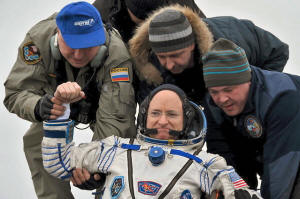|
 Back
on Earth, U.S. astronaut faces science labs without the view Back
on Earth, U.S. astronaut faces science labs without the view
 Send a link to a friend
Send a link to a friend
[March 04, 2016]
By Irene Klotz
CAPE CANAVERAL, Fla. (Reuters) - The
return of NASA astronaut Scott Kelly from the longest U.S. space mission
on record will kick off a wave of medical tests and experiments intended
to pave the way for extended human missions to Mars.
|
|
 Kelly, 52, is scheduled to give a news conference at NASA’s
Johnson Space Center in Houston on Friday to discuss his 340-day
mission aboard the International Space Station. Kelly, 52, is scheduled to give a news conference at NASA’s
Johnson Space Center in Houston on Friday to discuss his 340-day
mission aboard the International Space Station.
He left the station on Tuesday in a Russian Soyuz capsule, landed in
Kazakhstan, then headed home to Houston.
“I’m used to going 17,500 miles per hour, but this airplane doesn’t
quite do that,” Kelly quipped after a belated 2:30 a.m. EST/0730 GMT
touchdown on Thursday at Ellington Field near the Johnson Space
Center.
He was welcomed by a crowd that included Jill Biden, wife of Vice
President Joe Biden, who gave him beer and apple pie.
 “Welcome back to Earth,” President Barack Obama wrote to Kelly on
Twitter. “Your year in space is vital to the future of American
space travel. Hope gravity isn't a drag!”
Kelly is undergoing initial medical checks at the space center as he
starts recovering from his time in the weightless and high-radiation
environment of space.
He and Russian cosmonaut Mikhail Kornienko served about twice as
long as previous crews as part of a pilot program to help NASA and
its partners prepare for eventual human missions to Mars that will
last at least two years.
[to top of second column] |

Scientists are studying how the human body fares during longer stays
in space. Before landing, Kelly told reporters he had experienced
some changes in his vision, a relatively newly discovered affliction
that affects about half of astronauts on long-duration space
missions.
Kelly's participation in the mission also gave doctors an
opportunity to look at possible genetic changes from spaceflight.
Researchers have been studying whether he and his identical twin
brother, former astronaut Mark Kelly, are as genetically similar now
as they were before Scott Kelly’s launch in March 2015.
(Editing by Colleen Jenkins)
[© 2016 Thomson Reuters. All rights
reserved.]
Copyright 2016 Reuters. All rights reserved. This material may not be published,
broadcast, rewritten or redistributed.
 |